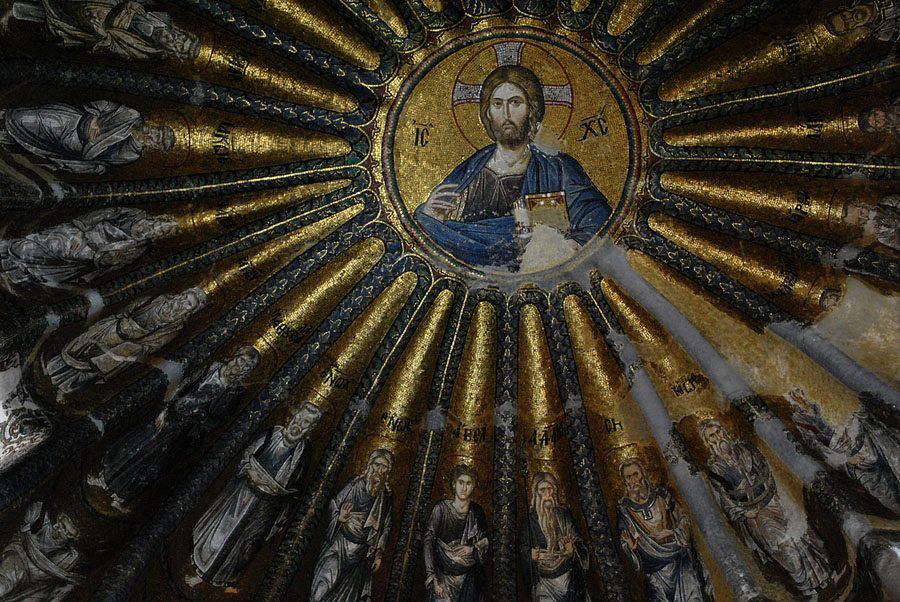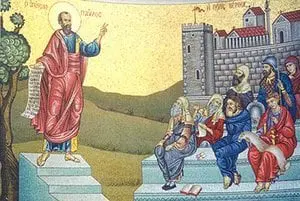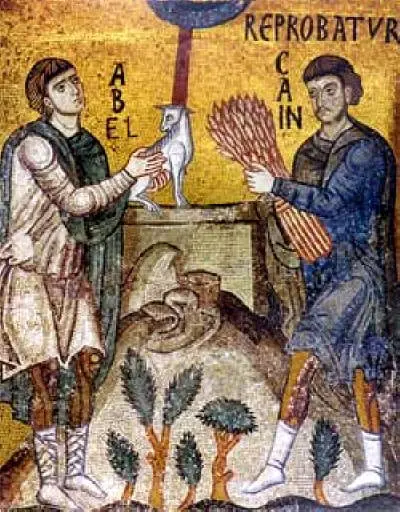Matthew 6:19. Lay not up for yourselves treasures on earth, where moth and rust destroy and where thieves break in and steal,
In this verse, the Savior immediately moves on to a subject that seems to have no connection with His previous instructions. Tsang explains this connection as follows: “Jesus, speaking to His disciples in the hearing of the Jewish crowd, does not preach here in general against the pagan and worldly way of thinking (cf. Luke 12:13-31), but shows the incompatibility of such with piety, which the disciples should and will take care of. This is where the connection with the previous parts of speech lies. Until that time, the Pharisees were considered by the people mainly as pious people, but with pious zeal, which Jesus Christ never denied for them, worldly interests were associated with many Pharisees and rabbis. Next to pride (Matt. 6:2, 5, 16, 23:5–8; Lk. 14:1, 7–11; Jn. 5:44, 7:18, 12:43) is indicated mainly by their love of money. Thus, the section under consideration also serves to explain Matthew 5:20.
It can be assumed that such an opinion quite accurately reveals what the connection is, if only there really is one between these different sections. But the connection can be expressed more clearly. We think that the entire Sermon on the Mount is a series of obvious truths, and that it is sometimes extremely difficult to find a connection between them, just as it is difficult to find it in a dictionary between words printed on the same page. It is impossible not to see that Tsan’s opinion about such a connection is somewhat artificial, and, in any case, such a connection could hardly be seen by the disciples to whom Jesus Christ spoke, and the people. Based on these considerations, we have every right to consider this verse the beginning of a new section, which deals with completely new subjects, and, moreover, without the closest relation to the Pharisees or the Gentiles.
Christ in the Sermon on the Mount not so much convicts as teaches. He does not use reproofs for their own sake, but again – for the same purpose – to teach. If one can assume a connection between the various sections of the Sermon on the Mount, then it seems to consist in a variety of indications of perverted concepts of righteousness, which are characteristic of a natural person. The thread of the Sermon on the Mount is a description of these perverse concepts and then an explanation of what the true, correct concepts should be. Among the perverted concepts of a sinful and natural man are his concepts and views on worldly goods. And here the Savior again allows people to conform to the teaching given by Him, it is only a light in which moral work is possible, which has the goal of moral improvement of a person, but not this work itself.
The correct and general view of earthly treasures is: “Lay not up for yourselves treasures on earth.” There is no need to argue, as Tsang does, about whether here only “large savings”, “gathering large capitals”, the enjoyment of them by a miser, or also the collection of insignificant capitals, cares for daily bread are meant. The Savior does not seem to speak of either. He expresses only a correct view of earthly riches and says that their properties in themselves should prevent people from treating them with special love, making their acquisition the goal of their lives. The properties of earthly riches, indicated by Christ, should remind people of non-acquisitiveness, and the latter should determine a person’s attitude to wealth and, in general, to earthly goods. From this point of view, a rich person can be just as non-possessive as a poor person. Any, even “large savings” and “gathering of large capitals” can be correct and legal from a moral point of view, if only the spirit of non-acquisitiveness, indicated by Christ, is introduced into these actions of a person. Christ does not require asceticism from a person.
“Do not lay up for yourselves treasures on earth” (μὴ θησαυρίζετε θησαυρούς) would seem to be better translated as follows: do not value treasures on earth, and “on earth” will, of course, refer not to treasures, but to “do not value” (“do not collect”). Those. do not collect on the ground. If “on earth” referred to “treasures”, i.e. if “earthly” treasures were meant here, then, firstly, it would probably stand, θησαυρούς τοὺς ἐπὶ τῆς γῆς, as it would be in the next verse, or, perhaps, τοὺς θησαυρούς ἐπὶ τ ῆς γῆς. But Tzan’s indication that if “on earth” referred to treasures, then one would expect οὕς instead of ὅπου here, can hardly be accepted, because οὕς could stand in both cases. Why shouldn’t we store up treasures for ourselves on earth? Because (ὅπου ηαβετ ᾳιμ αετιολογιαε) there “moth and rust destroy and thieves break in and steal.” “Moth” (σής) – similar to the Hebrew word “sas” (Is.51:8 – only once in the Bible) and has the same meaning – should be taken in general for some harmful insect that harms property. Also the word “rust”, i.e. rust. By this last word one must understand decay of any kind, because the Savior did not want, of course, to say that only those objects that are subject to damage from moths or rust should not be preserved (although the literal meaning of these words is this), but was expressed only in a general sense; the following words are said in the same sense, because the cause of losses is not only digging and theft in the literal sense. The parallel place is in James 5:2-3. The rabbis had a common word for rust, “chaluda” (Tolyuk, 1856).
Matthew 6:20. but lay up for yourselves treasures in heaven, where neither moth nor rust destroys, and where thieves do not break in and steal,
The opposite of the previous one. Of course, obviously, spiritual treasures that are not subject to the same extermination as earthly ones. But there is no closer definition of what exactly these spiritual treasures should consist of (cf. 1 Pet. 1:4-9; 2 Cor. 4:17). The explanation here requires only “do not destroy” (ἀφανίζει – the same word that is used in verse 16 about persons). Ἀφανίζω (from φαίνω) here means “remove from view”, hence – destroy, destroy, exterminate. The rest of the construction and expression is the same as in verse 19.
Matthew 6:21. for where your treasure is, there your heart will be also.
The meaning is clear. The life of the human heart is concentrated on that and about that which a man loves. A person not only loves this or that treasure, but also lives or tries to live near them and with them. Depending on what treasures a person loves, earthly or heavenly, his life is either earthly or heavenly. If love for earthly treasures prevails in a person’s heart, then heavenly treasures fade into the background for him, and vice versa. Here in the words of the Savior there is a deep conviction and explanation of the secret, heartfelt human thoughts. How often we seem to care only about heavenly treasures, but with our hearts we are attached only to earthly ones, and our very aspirations to heaven are only an appearance and a pretext for hiding from prying eyes our love abundance for earthly treasures only.
Instead of “your” Tischendorf, Westcote, Hort and others – “your treasure”, “your heart”. So on the basis of the best authorities. Perhaps in the recepta and many italics “thine” is replaced by the word “your” in order to agree with Luke 12:34, where “thine” is not in doubt. The purpose of using “thine” instead of “your” may have been to designate the individuality of the heart’s inclinations and aspirations of man, with all their infinite variety. One loves one thing, the other loves another. The familiar expression “my heart lies” or “it does not lie to this one” is almost equivalent to the gospel expression of this verse. It can be paraphrased as follows: “Where is what you consider your treasure, there your heart thoughts and your love will go.”
Matthew 6:22. The lamp for the body is the eye. So if your eye is clear, then your whole body will be bright;
Matthew 6:23. but if your eye is evil, your whole body will be dark. So if the light that is in you is darkness, then what is the darkness?
The interpretation of this place by the ancient church writers was distinguished by simplicity and literal understanding. Chrysostom accepts “pure” (ἁπλοῦς) in the meaning of “healthy” (ὑγιής) and interprets it as follows: “For as a simple eye, i.e. healthy, illuminates the body, and if it is thin, i.e. painful, darkens, so the mind darkens from care. Jerome: “Just as our whole body is in darkness, if the eye is not simple (simplex), so if the soul has lost its original light, then the whole feeling (sensual side of the soul) remains in darkness.” Augustine understands by the eye the intentions of a person – if they are pure and correct, then all our deeds, proceeding from our intentions, are good.
Some modern exegetes look at this matter differently. “The idea of verse 22,” says one of them, “is rather naive—that the eye is an organ through which light finds access to the whole body, and that there is a spiritual eye through which spiritual light enters and illuminates the whole personality of a person. This spiritual eye must be clear, otherwise the light cannot enter and the inner man lives in darkness.” But even from the point of view of modern science, what other organ can be called a lamp (at least for the body), if not the eye? The idea of verse 22, therefore, is not at all as “naive” as it is imagined, especially since the Savior does not use the expressions “finds access”, “enters”, which are used by people familiar with the latest conclusions of the natural sciences. Holtzman calls the eye “a specific light organ (Lichtorgan), to which the body owes all its light impressions.” Undoubtedly, the eye is the organ for their perception. If the eye is not pure, then – whichever of these expressions we choose – the light impressions we receive will not have such liveliness, regularity and strength as a healthy eye has. It is true that, from a modern scientific point of view, the expression: “the lamp for the body is the eye” might seem not entirely clear and scientifically correct. But the Savior did not speak modern scientific language to us. On the other hand, modern science is no stranger to such inaccuracies, for example, “the sun rises and sets,” while the sun remains motionless, and no one should be blamed for such inaccuracies. So, the expression should be considered correct and equivalent to the modern scientific expression: the eye is an organ for the perception of light impressions. With this understanding, there is no need to introduce further reasoning, as if the opposite reasoning of this and the following verse instills a contrast between generosity and alms, and that, according to the Jewish axiom, a “good eye” is a metaphorical designation of generosity, “bad eye” – stinginess. It is true that in several places in Scripture “greedy” and “envious” eyes are used in this sense (Deut. 15:9, 28:54-56; Proverbs 23:6, 28:22, 22:9; Tov. 4:7; Sir. 14:10). But in the passage under consideration there is no talk of generosity or almsgiving, but simply it turns out what should be the attitude of a person to earthly goods. In this last and the connection of the 22nd and 23rd verses with the preceding speech. A dim, gloomy, sore eye loves to contemplate the earthly things more; it is hard for him to look at the bright light, at the heavenly. According to Bengel, in Scripture words expressing simplicity (ἁπλοῦς, ἀπλότης) are never used in a negative sense. Simple and kind, having heavenly intentions, striving for God – one and the same thing.
In verse 23, the opposite of the previous speech. The last sentences of this verse have always seemed difficult. One can observe in this place an extremely poetic and subtle play on words and translate in the same way as in our Russian (in the Slavic translation – “tma kolmi” – exactly, but unclear) and the Vulgate (ipsae tenebrae quantae sunt), without referring the word “darkness” to “the inner thoughts of a person, his passions and inclinations”. The latter meaning is only further and improper, since images and metaphors serve as a designation of internal spiritual relations. The metaphor is based on the difference in degrees of darkness, ranging from lack of light, twilight, and ending with total darkness. The eye is unhealthy (πονηρός) as opposed to healthy (ἁπλοῦς), and the body is only partly illuminated; in other words, the eye only partially perceives light, and, moreover, incorrect impressions. So “if the light in you” equals darkness, then “how much darkness”. Grimm explains this expression as follows: “If your inner light is darkness (dark), i.e. if the mind is devoid of the faculty of understanding, how great will be the darkness (how much more pitiable it is compared to the blindness of the body). Σκότος refers to the so-called “fluctuating” expressions of the classics, who use it in both the masculine and neuter genders. In Matthew 6:23 – the neuter gender and is used in the meaning of “ill health”, “destruction” (cf. John 3:19; Acts 26:18; 2 Cor. 4:6 – Kremer).
(to be continued)
Source: Explanatory Bible, or Commentaries on all the books of the Holy Scriptures of the Old and New Testament: in 7 volumes / ed. A. P. Lopukhin. – Fourth edition, Moscow: Dar, 2009 (in Russian).







